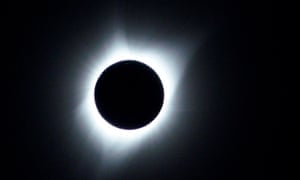Nothing New Under the Sun?

Yesterday's total eclipse of the sun, causing 2 minutes of day to become night for millions of Americans, was nicely timed...
...It comes around about once every 350 years, in the place where you live. The next eclipse coming to Redhill is due in 2024. The phenomenon that causes a total eclipse is fascinating and enlightening (pun intended):
Consider that the sun is about 400 times the diameter of the moon, which would make it awfully hard for the lunar disk to fit so perfectly over the solar one—except that the sun is also about 400 times more distant, meaning that the two bodies appear to be the same size in the earthly sky. Consider the way the moon’s ragged mountains, which are impossible to see from as far away as Earth, form a sawtooth pattern at the lunar edges through which the last of the sun’s light streams in the moments before a total eclipse is complete, creating the brilliant burst of light astronomers call the diamond ring effect.
...For our Space Explorers Holiday Club. Thank you, Lord, for a great reminder of the vast, beautiful, mind-blowing universe in which we live!
..Because this book excerpt came into my inbox a couple of days ago, and I read it this morning. It is a commentary on the book of Ecclesiastes. Some of the best known verses from this book of the Old Testament are these:
2 Vanity of vanities, says the Preacher, vanity of vanities! All is vanity. 3 What does man gain by all the toil at which he toils under the sun? 4 A generation goes, and a generation comes, but the earth remains forever. 5 The sun rises, and the sun goes down, and hastens to the place where it rises. 6 The wind blows to the south and goes around to the north; around and around goes the wind, and on its circuits the wind returns. ... 9 What has been is what will be, and what has been done is what will be done, and there is nothing new under the sun.
Ecclesiastes Chapter 1
The writer of Ecclesiastes' observation is this: men and women long to come across something in their lives that will break the constant repetitive cycle, something to say or see or hear that will be truly new and therefore signicant—but there is nothing. No such thing exists. Whatever we see and hear has already been and gone, covered by the sands of time and simply rolling around again, perhaps in a different guise but basically the same as before.
That explains our fascination with anything new or 'different' from the norm - such as an eclipse which thrills and fascinates because it is so unusual and causes us to lift our eyes above the routine to marvel at the beauty and complexity in our world.
But what difference would it make if we began to take a moment-by-moment interest in life 'under the sun'. Not to see things as simply routine, but to delight in the world that the Bible tells us God has made to point us to himself? To delight in the coming of a new season, in the repetition of the sun rising and setting, to delight in each day as a gift from God rather than 'same old, same old'. We need to see life through these new glasses to get a fresh perspective on life.
The title of the book (Living Life Backwards) reflects the author's main point: that if we see life simply as rolling on and on, one day after another, with endless cycles of repetition and 'meaninglessness', then we fail to live. But to recognise the truth that one day life will come to an end makes all the difference under the sun. Here is his opening line:
I am going to die. By the time you read these lines, I may even be dead. It’s not that I have a virulent disease or a terminal illness. A doctor has not pronounced on how I am going to die. I don’t know when I will die. I just know I will. I am going to die, and so are you. But here is why I wrote this book: I am ready to die.He goes on...
Ecclesiastes teaches us to live life backward. It encourages us to take the one thing in the future that is certain—our death—and work backward from that point into all the details and decisions and heartaches of our lives, and to think about them from the perspective of the end. It is the destination that makes sense of the journey. If we know for sure where we are heading, then we can know for sure what we need to do before we get there.
'Life under the sun' ceases to be dull repetition and begins to feel like the 'life in all its fullness' that Jesus promises, with this perspective.
But you will need new glasses to see it - glasses which the writer of Ecclesiastes begins to see through, and which Jesus ultimately and uniquely gives to those who look to him. I reckon that buying and reading 'Living Life Backwards' might be a good investment of time spent under the sun.



Comments
Post a Comment